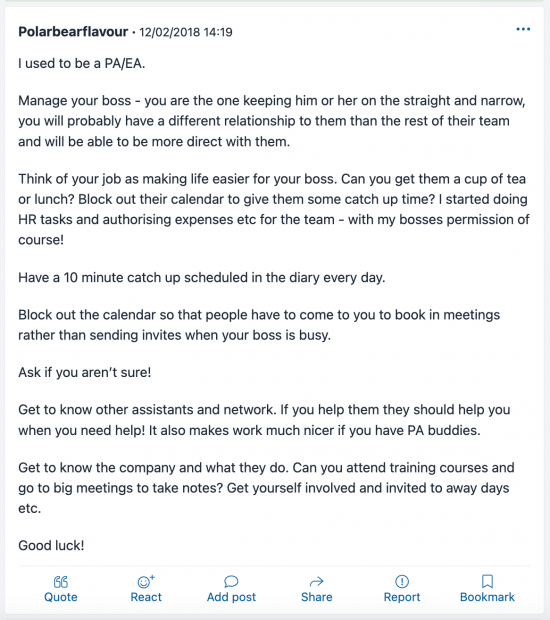If you are considering looking for a PA role but asking yourself, "What is it like to be a personal assistant?", you're in the right place! We've asked some of the PAs we have worked with to provide their insights, and we found comments from PAs left on forums to provide you with a full account of life as a PA.
What Does A PA Role Entail?
Whilst no two PA roles are the same, there are several common tasks we see in most PA positions.
These include:
- Diary management
- Booking all travel, hotels and transfers
- Handling itineraries
- Scheduling meetings
- Inbox management
- Taking minutes in meetings
- Personal tasks and errands and providing private support
- Answering phone calls
For a more detailed look at the day-to-day duties of a PA, take a look at this, take a look at this typical PA job description here and learn more about average PA salaries.
Insights Into What It Is Like Being a PA
We asked some of the PAs we have been privileged to work with to give their insights into what it is like to be a PA, covering everything from the good to the amazing and the challenging.
Here are some of the insights we gathered from them sharing their experiences.
No two days are the same
Personal assistants often juggle many responsibilities, from routine office tasks to high-stakes project management. Lauren, a PA supporting a real estate investment partner, notes,
"There is always the opportunity to be involved in a variety of projects, whether that be organising events or project managing a task from beginning to end."
This versatility is part of the role's appeal for Charlotte, a Private PA, who enjoys the unpredictability:
"No two days are ever the same, there is no routine, you find yourself looking for the most unthinkable things sometimes and it makes the job very rewarding!"
Handling such a wide range of duties is par for the course as a PA. While the workload can be demanding, it also promises an engaging career full of variety and challenges to tackle each day. If you thrive in a dynamic environment, being a personal assistant offers an ever-changing mix of tasks to complement the more routine ones.

Things will not go according to plan
The fast-paced industries where PAs operate demand a constant ability to adapt and manage high-pressure situations. Victoria, who has served in a strategic PA role, highlights the critical need for flexibility and tactical thinking:
"My biggest challenge is complex diary management - it's fast-paced and ever-changing."
Charlotte echoes this, pointing out:
"The biggest challenge of all is knowing that plans always change and often at the last minute, so you can never be sure, or actually almost always be sure things will not go according to plan!"
Staying agile and keeping composure when inevitable curveballs get thrown is key for PAs. Thriving in this role requires rolling with the punches, quickly adjusting priorities, and calmly navigating the intensity of rapidly shifting schedules and projects. For those who embrace flexibility, the ever-changing nature of personal assisting can be an invigorating challenge.
Being the go-to person
Personal assistants must navigate nuanced relationships with their employers, developing a keen understanding of personal preferences and temperaments. Sophia, a PA in professional services, explains:
"Being the go-to person for my Executives... makes the job exciting and challenging as you never know what's going to come your way."
This closeness can sometimes breed envy from colleagues, as Charlotte reveals:
"Being a private PA is about representing your boss at all times... working as the closest person to the boss creates lots of jealousy around you."
Fostering a strong rapport while maintaining boundaries is an art form for PAs. Reading situations and personalities, anticipating needs, and acting as a representative requires emotional intelligence and tact. This proximity allows PAs to build deep trust and form irreplaceable partnerships with their executives.
Juggling changing priorities
Personal assistants face the practical challenge of prioritising ever-shifting demands. Lucy illustrates the constant juggling act:
"There's nothing worse than when I've just got stuck into a great project that requires quite a bit of my time and focus and then I have a request through for something to be done urgently."
Sophia adds her perspective on these fluctuating priorities:
"The biggest challenge is definitely juggling the changing priorities as my Executive's workday changes every day, so making sure I am proactive as well as reactive to keep on top of everything."
Their sentiments underscore the dynamic – at times chaotic – nature of managing a heavy and varied workload. Staying composed while deftly reordering priorities in response to rapidly evolving situations tests a PA's adaptability and focus daily. The ability to swiftly triage competing demands and pivot between proactive strategic work and reactive urgencies is indispensable.
Discretion is paramount
Confidentiality is a cornerstone of a personal assistant's role, underpinning the trust and professionalism expected in their conduct. Dominique, a PA to a busy CEO at a Global Risk Management and Security consultancy, emphasises the high standards required:
"Every company expects a certain level of confidentiality, but this is an industry where you have to really make sure nothing is leaked."
For those in private PA roles, discretion takes on heightened importance. As Charlotte points out:
"Being a private PA is about representing your boss at all times, therefore discretion is paramount."
Handling sensitive information with the utmost care and integrity reflects directly on a PA's competence and the confidence their employers and stakeholders place in them. Upholding strict confidentiality policies is an obligation and a testament to a PA's judgement, loyalty and impeccable professionalism.
Really adding value to the company
The personal assistant role extends far beyond administrative tasks, allowing PAs to add strategic value that elevates their impact within the company. Victoria cherishes this value-add:
"I really enjoy having more of a strategic PA role and the feeling that I am really adding value to the company. By having a good understanding of the business and its priorities, it gives me the sense of being a valuable right-hand support to my boss."
Lucy, an experienced PA, echoes the profound sense of worth the role provides:
"Being a PA gives me a huge sense of value within the company. It's great to be the 'go-to' person within the team when people have questions. I'm super organised and thrive on being the small cog that makes the wheel of the wider company turn!"
Functioning as this vital enabler highlights how exemplary organisation and stakeholder management skills allow PAs to be indispensable assets.
What is clear here is that personal assistants transcend support roles to become valued partners driving strategic initiatives. By developing a deep understanding of business operations, they can expertly prioritise and anticipate needs, seamlessly propelling company objectives forward.
If you’re interested in becoming a PA, you may want to read our PA CV Advice and our article on common PA interview questions and answers to make sure you stand the best chance during the application process.
It depends on who you work for
Sue Smith, a celebrity assistant, wrote a top-rated comment on Quora, stating:
As the PA role requires you to work so closely alongside the executive to anticipate their every need, it’s important to meet the person you will be supporting before you commit to a job to assess if you think you will be the right fit for each other. Ask questions about things that are important to you in your role. Use your judgment and watch out for red flags.
You will manage your boss
This MumsNet user shares their perspective on managing the executive you support:
Benefits of being a personal assistant
Along with the insights shared above, here are some additional benefits of working as a personal assistant.
You manage your own workload
Generally speaking, your boss will allow you to work in a way that suits you and allow you to manage your own workload, as long as the work gets done. Although a good PA will adapt their working style according to the person they are supporting, once trust is built, you can often be left to get on with it yourself without micromanagement.
Exposure to the Senior Leadership team
A personal assistant role usually involves supporting someone senior, be it within a business or a private individual, and therefore, the exposure the PA gets can be fascinating. From reading through your boss’s inbox to sitting in on meetings, you will most likely be exposed to sensitive and confidential information. All PAs must remain discreet, but the more you understand the business needs, the better support you will be able to provide.
Involved in business decisions
Through the PA position, you will gain exposure to the operations of a business and learn about important deals and projects. A PA can be a valuable sounding board for key decision-makers, and your input can be highly valuable, especially if you act as a representative for your boss.
Build an amazing relationship
Working so closely with one or two people inevitably means you end up building a very close relationship with them. Sometimes, a PA can move with their boss from one company to the next as they progress their career path, and you can stay working for the same person for many years.
Opportunity to travel
If the person you support requires it, there can be opportunities to travel with your boss if he or she will need you on the ground where they are going.
According to this MumsNet user, it’s worth arranging for a second passport if your exec travels internationally a lot.
Lots of variety
One of the benefits of the PA role is the scope and variety of the role, which makes each position different to the next. Some PA positions will include managing events and projects, and these different challenges can all enhance your skill set, allowing you to continue learning and developing as your career progresses.
Disadvantages of being a personal assistant
Contacted outside of office hours
Being a personal assistant can be stressful at times. Depending on how your boss likes to work, you may be contacted outside of core working hours, particularly if there is an urgent request. This can be more common if your boss is travelling and is in a different time zone than you, so you must be prepared to be on call if required. This can make it harder to maintain boundaries between work and personal life.
More menial tasks
Along with the exciting projects and working at the senior level, one drawback of a PA role can be the more basic administrative tasks your boss may need help with. This can include managing expenses, data entry or running personal errands. However, this will be highly valuable to the person you support and allow them more time to focus on other things.
No team support
The PA role can be isolating if you don’t have a team of other assistants around you. In smaller companies or private households, you may be the only admin support, and therefore, you wouldn’t have a team in place to provide cover if required. This is not the case in all PA roles, so if a support system is important to you, make sure that is clear when searching for your next role.
Looking To Become Someone’s Personal Assistant? Oriel Partners Can Help You Find Your Dream PA Role!
Hopefully, we’ve helped you understand why becoming a personal assistant is a great opportunity. If you are looking for a new PA role, we would love to help you find your dream job. Please take a look at the Oriel Partners PA job board for a list of our current PA vacancies. We work on PA roles across all industry sectors, both in a business and private capacity and have an experienced team of consultants who are ready to advise and support you through the search process.





